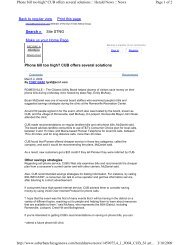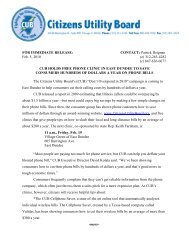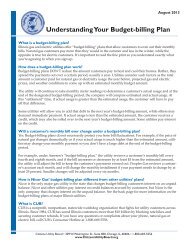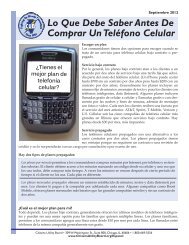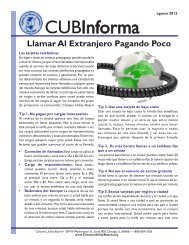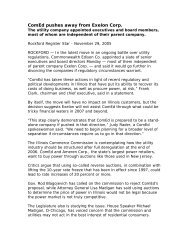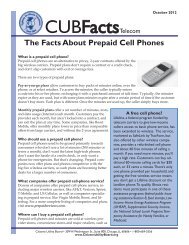the current edition - Citizens Utility Board
the current edition - Citizens Utility Board
the current edition - Citizens Utility Board
You also want an ePaper? Increase the reach of your titles
YUMPU automatically turns print PDFs into web optimized ePapers that Google loves.
CUB study: Exelon a profit giant now and in <strong>the</strong> future<br />
Continued from p. 1<br />
posal. CUB will appeal any vote<br />
against consumers.<br />
A wide spectrum of critics—from<br />
Gov. Rod Blagojevich to a former Reagan<br />
Administration economist—have<br />
said an auction would lead to unreasonably<br />
high rates. After conducting<br />
similar auctions, New Jersey’s rates<br />
increased by 28 percent and Ohio<br />
was so unhappy with <strong>the</strong> outcome<br />
that it did away with <strong>the</strong> system.<br />
Although Illinois law mandates that<br />
utilities buy power at <strong>the</strong> least cost<br />
possible, <strong>the</strong> consultant who designed<br />
<strong>the</strong> auction for Exelon admitted in testimony<br />
before <strong>the</strong> Illinois Commerce<br />
Commission (ICC) that producing <strong>the</strong><br />
lowest price isn’t an auction goal.<br />
In fact, <strong>the</strong> auction would all but<br />
end <strong>the</strong> authority of Illinois regulators<br />
to ensure that rates are fair, opening<br />
<strong>the</strong> door for unlimited rate hikes.<br />
Yet, under <strong>current</strong> regulation, Exelon<br />
has been a profit giant—even<br />
with a 20 percent rate cut and freeze<br />
implemented by <strong>the</strong> 1997 state law<br />
that restructured <strong>the</strong> power industry,<br />
a CUB study found.<br />
Study author Edward Bodmer, a<br />
Take Action<br />
former ICC staffer and vice president<br />
of <strong>the</strong> First National Bank of Chicago,<br />
found that Exelon’s stock value<br />
has jumped by $18 billion since 1997,<br />
and its 21 percent return on investment<br />
beats all o<strong>the</strong>r major utilities<br />
across <strong>the</strong> country.<br />
In fact, <strong>the</strong> utility has outperformed<br />
<strong>the</strong> S&P 500, a stock market barometer,<br />
by more than 1,500 percent.<br />
The future also looks bright for Exelon.<br />
Even under a rate freeze or cut,<br />
its profit rate would remain far above<br />
<strong>the</strong> average return on equity of about<br />
10 percent allowed for electric utilities<br />
by o<strong>the</strong>r regulatory commissions.<br />
Under a rate freeze, Bodmer projects<br />
Exelon’s profit rate would hover between<br />
18 and 19 percent through 2012.<br />
With a 5 percent rate cut, <strong>the</strong> profit rate<br />
would be around 17 percent.<br />
“Far from suffering under sensible<br />
regulation, ComEd’s parent company<br />
has been a profit juggernaut,”<br />
CUB Executive Director David Kolata<br />
said. “Simply put, Exelon wants<br />
ComEd to become a deregulated<br />
monopoly—making obscene profits<br />
while wiping out meaningful regulation<br />
in Illinois.”<br />
Rate-hike Roundup<br />
A summary of <strong>the</strong> three Exelon/ComEd rate-hike proposals—totalling 39<br />
percent—before state or federal regulators.<br />
Potential<br />
Rate Hike<br />
Case<br />
(39% total) Update<br />
Delivery rate hike.<br />
(Dispute over what ComEd<br />
should charge customers to<br />
deliver power.)<br />
Auction case.<br />
(Dispute over how ComEd<br />
will buy power in 2007.)<br />
Federal rate hike.<br />
(Dispute before federal<br />
regulators over plan to<br />
raise wholesale rates.)<br />
6% CUB and <strong>the</strong> Illinois Attorney General’s<br />
office filed testimony with Illinois Commerce<br />
Commission (ICC) to wipe out<br />
proposed increase—and give customers<br />
a rate cut of at least $115 million. An<br />
ICC ruling is expected by end of July.<br />
16% At press time, a ruling on <strong>the</strong> case was<br />
expected by end of January. CUB will<br />
appeal any anti-consumer ruling.<br />
17% CUB has joined with consumer advocates<br />
to argue against wholesale rate<br />
increases before <strong>the</strong> Federal Energy<br />
Regulatory Commission (FERC). Federal<br />
ruling expected by end of 2006.<br />
Breaking news: Rate-hike plans revealed<br />
ComEd and Ameren propose hundreds<br />
of millions of dollars in rate<br />
hikes—on top of <strong>the</strong> increases <strong>the</strong>ir<br />
“auction” plans would bring.<br />
The proposed increases are to “delivery-service<br />
tariff” (DST) rates—<br />
what utilities can charge customers<br />
to deliver power to <strong>the</strong>ir homes.<br />
ComEd proposes a $350 million<br />
Fact vs. Fiction<br />
Your guide to ComEd’s claims<br />
CUB Executive Director David Kolata<br />
announces an ad campaign to answer<br />
ComEd’s misleading claims.<br />
In hopes of securing nearly $1<br />
billion in rate hikes, ComEd and its<br />
parent company, Exelon, have been<br />
spreading misinformation through<br />
a front group called CORE and a<br />
$4 million TV campaign.<br />
What follows is an analysis by<br />
CUB of arguments made by ComEd<br />
over <strong>the</strong> past several months to justify<br />
a 39 percent increase in power<br />
bills.<br />
ComEd Claim: If we don’t get<br />
a rate hike, we could go bankrupt<br />
and Illinois could suffer widespread<br />
power outages, similar to<br />
<strong>the</strong> crisis California endured several<br />
years ago.<br />
CUB Analysis: Illinois has so<br />
many power plants that we export<br />
electricity to o<strong>the</strong>r states. Talk of<br />
ComEd bankruptcy ignores <strong>the</strong><br />
fact that its parent company, Exelon,<br />
had a record profit of $1.9 billion<br />
in 2004, and analysts predict<br />
it will continue to flourish even if<br />
rates are frozen. While Exelon says<br />
it absolutely needs higher rates in<br />
Illinois, it sings a different tune in<br />
Pennsylvania, where it locked in a<br />
$120 million rate cut through <strong>the</strong><br />
increase in DST rates. Ameren—<br />
<strong>the</strong> parent of AmerenCILCO, AmerenCIPS,<br />
and AmerenIP—proposes<br />
three separate “DST” rate hikes totalling<br />
$200 million.<br />
CUB has proposed wiping out<br />
Exelon’s rate hike, and <strong>the</strong> consumer<br />
group is studying <strong>the</strong> Ameren<br />
proposal.<br />
end of <strong>the</strong> decade.<br />
ComEd Claim: Our rates are <strong>the</strong><br />
same today as <strong>the</strong>y were in 1995.<br />
No company can be expected to go<br />
so long without raising prices.<br />
CUB Analysis: Just because<br />
ComEd hasn’t had an increase<br />
doesn’t mean it automatically deserves<br />
one. Its customers used to<br />
pay some of <strong>the</strong> highest rates in<br />
<strong>the</strong> nation, before a 1997 state law<br />
ordered a 20 percent rate cut. It<br />
took a record rate cut just to get<br />
ComEd’s prices at roughly <strong>the</strong> Midwest<br />
average, and yet <strong>the</strong> company<br />
still is raking in record profits.<br />
ComEd Claim: Our “auction”<br />
plan does NOT limit state oversight<br />
of <strong>the</strong> power industry.<br />
CUB Analysis: ComEd’s plan<br />
is a radical departure from <strong>current</strong><br />
law, which requires <strong>the</strong> Illinois<br />
Commerce Commission (ICC)<br />
to ensure that rates are “just and<br />
reasonable.” The proposal would<br />
strip <strong>the</strong> ICC of any meaningful<br />
power to make sure consumers are<br />
charged a fair rate.<br />
ComEd Claim: Consumer<br />
groups that oppose an “auction”<br />
system have not proposed any alternatives.<br />
CUB Analysis: Consumer<br />
groups have said all along that<br />
ComEd can have its auction, or<br />
any o<strong>the</strong>r power-buying system it<br />
wants, as long as Illinois regulators<br />
retain <strong>the</strong> authority to assure<br />
fair rates. ComEd’s auction is just<br />
a clever way to lift reasonable regulations<br />
that for years have allowed<br />
<strong>the</strong> company to earn a healthy<br />
profit while protecting consumers.<br />
Contact your state legislators and urge <strong>the</strong>m to take consumer-friendly positions<br />
on utility issues. To be connected directly to your legislator’s office,<br />
call AARP’s electrical advocacy hotline, 1-800-719-3020, or log on to www.<br />
StopComEdRateHike.com. Ameren has similar proposals. Find out more at<br />
www.StopAmerenRateHike.com.<br />
Winter 2005-2006 3



